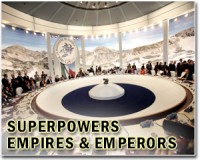| . |  |
. |
Brasilia, Brazil (UPI) Jan 27, 2011 U.S. President Barack Obama faces tough diplomatic maneuvers ahead of a March tour of three of the countries the administration sees as potential trade partners. With plans in place for the president to visit Brazil and Chile in South America and El Salvador in Central America, the visit has raised government eyebrows in countries Obama isn't visiting. Argentina is reportedly upset and long-time partner Colombia is on a course of cautious rapprochement with Venezuela after years of tensions over guerrilla activity linked to the narcotics trail to North America. Obama announced his intention to travel to the Latin American countries in his State of the Union address but it remains unclear how the visit will tie into the administration's avowed intention to rebuild bridges with Latin America after several years of neglect amid U.S. preoccupations in the Middle East. U.S. diplomatic moves to strengthen relations with Latin American countries faced renewed challenges after Washington was caught in the middle of a Honduran crisis with the 2009 ouster of elected President Manuel Zelaya by a military coup backed by the country's judiciary. The coup was replaced by President Porfirio Logo's government that has failed to win recognition in Latin America, leaving the United States out on a limb as the leading power behind a government that no one appears to want to deal with. Lobo has also been roundly condemned by independent watchdog organizations over alleged human rights violations in his treatment of dissent. Other than awkward uncertainties in Honduras, lack of progress on the anti-narcotics war in Colombia, despite a significant U.S. military deployment in that country, also fed into populist rhetoric from Venezuelan President Hugo Chavez, who said the drug operations were a veiled attempt to undermine his Bolivarian revolution. Argentina has conveyed its displeasure over what it sees as inadequate recognition of its strategic importance. U.S. Assistant Secretary of State Arturo Valenzuela visited Argentine twice in recent months and on both occasions couldn't see President Fernandez de Kirchner. During his first visit in December 2009 his critical comments on the judiciary system in Argentina led to a formal protest by the Argentine foreign ministry. On his second visit two weeks ago, Valenzuela emphasized Argentina's valuable role in the Union of South American Nations and regional cooperation, but his comments went unnoticed by Latin American media. Obama's focus in Brazil would be on energy collaboration and in Chile he will be welcomed after the U.S. role in the rescue of 33 miners in October. Obama will be meeting Dilma Rousseff, sworn in recently as Brazil's new president, replacing Luiz Inacio Lula da Silva, who was often critical of Washington and pursued a foreign policy at odds with state U.S. policy objectives. He backed Iran's nuclear program and was influential in the recent wave of South American governments' recognition of a Palestinian state within borders before the 1967 war. "I think the president believes that it is important for him to get to South America and Central America personally ... and strengthen, as we have in Asia and in Europe, strengthen our ties to that very important region of the world," White House Press Secretary Robert Gibbs said. Obama's visit will fall during the 50th anniversary of President John F. Kennedy's Alliance for Progress that aimed to promote economic and social development in Latin America. Chilean government officials welcomed Obama's planned visit. "This is an event that isn't repeated very often and we hope to make the most of it," Foreign Affairs Minister Alfredo Moreno said. "We think that it's a recognition, just as he mentioned in his State of the Union speech, that we are a country that does things responsibly and that shares common values, ideas and ways to improve development." Obama aides have said renewable energy and trade will top the agenda in Chile and Brazil. Despite prospects of success in talks during the visit, Obama still needs to deal with complex diplomatic issues with other countries that he isn't visiting, some of which are keen to develop ties with Washington and others remain skeptical about closer collaboration with their northern neighbor.
Share This Article With Planet Earth
Related Links Learn about the Superpowers of the 21st Century at SpaceWar.com Learn about nuclear weapons doctrine and defense at SpaceWar.com
 Gates heads to Canada for talks on war, weapons
Gates heads to Canada for talks on war, weaponsWashington (AFP) Jan 26, 2011 US Defense Secretary Robert Gates departed for Canada on Wednesday for talks on the war in Afghanistan as well Ottawa's plans to purchase F-35 fighter jets, the Pentagon said on Wednesday. Gates initially was due to meet both his Canadian and Mexican counterparts at a first-ever summit of North American defense ministers but Mexico's secretary of national defense, General Guillermo Galvan Ga ... read more |
|
| The content herein, unless otherwise known to be public domain, are Copyright 1995-2010 - SpaceDaily. AFP and UPI Wire Stories are copyright Agence France-Presse and United Press International. ESA Portal Reports are copyright European Space Agency. All NASA sourced material is public domain. Additional copyrights may apply in whole or part to other bona fide parties. Advertising does not imply endorsement,agreement or approval of any opinions, statements or information provided by SpaceDaily on any Web page published or hosted by SpaceDaily. Privacy Statement |